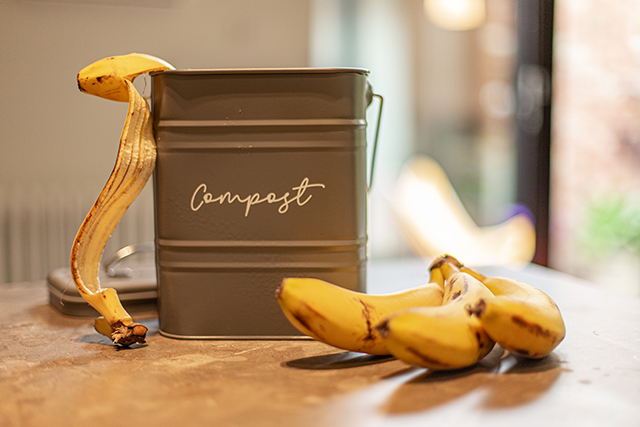We only have one planet Earth, making Earth Day the official reminder to treat our planet well. Though this environmentally friendly holiday is celebrated once a year (April 22 marks the event’s 52nd anniversary) these eco-friendly products for your home will help make every day a little greener.
With many brands using buzzwords like “sustainable,” “natural” and “zero-waste,” it can be hard to decipher what’s truly good for the planet and what’s hype. Start by reading the label and looking for products that have green certifications. It can take a little more planning and searching for the right goods, but in the long run you can save a lot of money by supporting Mother Nature (just a bonus!).
So whether you’re going zero-waste and stopping the use of single-use plastic products or you just want to start by shopping with a reusable bag, this green guide will help you adjust your carbon footprint. Remember, every small change makes a difference.
Kitchen
Kitchen waste accounts for much of the trash that comes from the common household – from eggshells and coffee grinds to copious amounts of single-use plastics. Start by thinking about where most of your kitchen waste comes from and find eco-friendly products to tackle those items.
Bee’s Wrap is reusable wrap made from cotton and beeswax that can replace plastic wrap and aluminum foil. You can swap out plastic containers with reusable containers made from more sustainable materials (look for glass or steel) like Klean Kanteen and LunchBots. Replace kitchen paper towels and sponges with things like NotPaper Towels, which can be washed and reused, or Swedish dishcloths, which are made from wood and cotton.
Another simple way to care for the planet is by composting your food waste. Start by simply collecting any food waste on your counter in a compost bin. Set up a compost bin in your yard or bring your food scraps to a local farmers market.
When making a trip to the grocery store, bring your own reusable shopping bags. Several states – including Connecticut, Maine, New York and Vermont – banned plastic bags in stores. Envirosax and Baggu are two sustainable brands that offer a variety of stylish reusable bags. Boon Supply, another eco-conscious brand, has products like these farmer’s market totes – made famous by the French – that are perfect for carrying fruit and veggies. Store smaller produce like berries or peas in these mesh drawstring bags. Bye-bye plastic bags!
Bathroom
The second-largest culprit for creating households waste is the bathroom. Between toothpaste containers, disposable razors and beauty and grooming products, your trash can fill up quickly. Instead of plastic and single-use products, look for brands with sustainable packaging that sell in bulk (less packaging) or have a refill program. This is a simple way to save a lot of money.
Think how many disposable razors you buy in one year. Swap this with a reusable razor from Leaf Shave that has a lifetime warranty. You’ll then only have to replace the razor blades. David’s is a green toothpaste brand with a recyclable metal tube and Georganics makes a variety of sustainable oral care products, including bamboo toothbrushes and mouthwash tablets with refills.
Deodorant, skin care, hair care? Opt for personal care products that have natural ingredients, recyclable packing or are reusable. Support brands that have a mission to care for the planet like Weleda, which makes plant-rich skincare products, Meow Meow Tweet, a small-batch vegan skin care company, and Attitude, where their natural products are EWG Verified. LastSwab makes reusable cotton swabs (you just wash with soap and water after using), while By Human+kind features a refillable packaging program for everything from shampoo to hand soap.
When thinking eco-friendly products, you may not necessarily think about things like a greener shower curtain or toilet paper, but there are greener options available. Coyuchi makes items like organic cotton shower curtains (no plastic liners needed) and bathroom towels made with practices that limit harm to the environment. Did you know that global toilet paper production consumes 27,000 trees daily? Save the trees and use toilet paper made from bamboo or skip toilet paper and go the European route by attaching a bidet to your toilet.

Bedroom
Most people spend about one third of their lives sleeping, so it makes sense to ensure your sleeping materials are green. Sleep and Beyond makes organic and natural bedding like sheets, pillows, comforters and mattress pads that are made in sustainable and fair-trade factories. Don’t forget your mattress! The Avocado Green mattress sounds as green as you think and is made from natural materials
Set the mood with solar lighting! Whether you’re camping or at home, Biolite makes a solar lighting starter kit to ease you into the world of renewable energy.
Green Cleaning
Consider cleaning with eco-friendly products made without harsh chemicals. Supernatural is a cleaning line that uses essential oils and offers refillable bottles. Win, win. Dr. Bronner has been a pioneer in natural products and saving the planet for years: its castile soap has 18 recommended uses for cleaning – face, body, hair, dishes, laundry, mopping, pets and more.
What about your dishwasher? Try Dropps, natural detergent pods that can be purchased as a subscription or in bulk. Need sponges? Sqwishful makes a plant-based compostable pop-up sponge and if you’re looking for reusable cleaning tools like brushes, Redecker has got your covered.
Wrapping Paper
Tons of wrapping paper goes to landfills each year. Combat this by buying sustainable paper or by supporting a reusable solution like Lilywrap, reusable fabric gift wrap with bows that can be used more than 50 times.
Not sure how to recycle an item? Visit TerraCycle.com, a resource that gives more information, tips and a list of brands that partner with the site to help recycle packaging.
What are your favorite eco-friendly products for the home? Share them with us in the comments below.
2 Thoughts on “Go Green With Eco-Friendly Products for Your Home”
Leave A Comment
Comments are subject to moderation and may or may not be published at the editor’s discretion. Only comments that are relevant to the article and add value to the Your AAA community will be considered. Comments may be edited for clarity and length.
















These are good tips, and it’s always helpful to remind everyone to conserve and protect the planet through best practices. However, there are trade-offs. For example, installing a bidet toilet seat will result in an increase in water usage, so we must weigh whether to do that or continue using toilet paper. Moreover, not everyone can compost; those who live in apartments and in some HOA communities do not have always have that option. And in our particular situation with the COVID-19 pandemic, such cleaners as disinfectant bleach, wipes and sprays are necessary, and they are not always environmentally friendly.
Further, when cotton products are recommend, remember that cotton takes a lot of water to produce. So many of the tips provided in this article simply swap conserving one resource for increased usage of another.
Finally, some methods are costly in time and money – things of which are not in great supply for most people these days.
“Going green” is a complicated subject and one that requires everyone to do their own research to find the best ways that they personally can conserve our natural resources, intelligently and practically.
Hi Jeanne, Thank you for your feedback and additional tips. These are all great points when it comes to “going green”. – KG